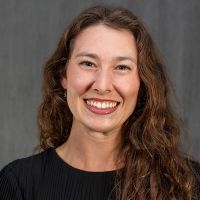Dr. Briana Krewson found family medicine when she was looking for everything else. A self-proclaimed “lover of everything” during medical school, she found herself drawn to each specialty she encountered. But it was a mentor’s insight that helped her connect the dots: “If you like everything, you should think about family medicine.”
That advice resonated deeply. “Family medicine lets me think about every system, every diagnosis,” Krewson says. “It’s like wearing a clever thinking cap every day.” Now poised to accept the American Osteopathic Foundation /American College of Osteopathic Family Physicians (ACOFP) Outstanding Resident of the Year in Family Medicine award, it seems that guidance was correct.
But even before medical school, the signs were there. An avid gardener in college, Krewson was fascinated by food systems and the human connection to the earth. That curiosity evolved into a broader question: What is health?
Her answer began to take shape through community advocacy and public health work. “With all my side projects and interests, I think family medicine was always going to be my destiny,” she reflects.
Her journey has been global. A Fulbright fellowship in Poland gave her a firsthand look at how education and health care intersect across cultures. “It was my first taste of what health could look like outside the U.S.,” she says. Teaching English to students of all levels—from conversational learners to science majors—she saw how education transcends boundaries and how European physicians navigate a vastly different health care landscape.
After returning to the United States, Krewson pursued a master’s degree in public health at Dartmouth, driven by a desire to understand the American health care system before committing to a career as a physician. That decision led her to Yellowknife, in subarctic Canada, where she worked with the Institute for Circumpolar Health Research. Her project focused on native foods and their role in Indigenous health and healing—an effort complicated by climate change and cultural disruption.
“That experience reminded me that primary care is an amazing place to start,” she says. “It’s about understanding different backgrounds and helping people find basic care. It’s about listening and being part of their world.”
Mentorship has been a cornerstone of Krewson’s development. In Madison, she credits Dr. Jennifer Svarverud as a clinic mentor and “a positive force of energy.” For her lifestyle medicine pathway, Dr. Karina Atwell and Dr. Maggie Larson have helped her explore ways to integrate holistic approaches into her practice. And for her osteopathic journey, Dr. Sarah James has been a guiding light. “She saw leadership energy in me and encouraged me to apply for roles with the ACOFP,” Krewson says. “She’s been a huge help.”
Her support system extends beyond medicine. “My mom and sister are my editors,” she adds. “They read all my essays and publications before they go live. They’re my ultimate mentors when it comes to making something sound better on paper.”
Now a chief resident with the UW Department of Family Medicine and Community Health (DFMCH), Krewson is paying it forward. “Medicine runs on mentorship,” she says. “I owe so much to the doors my mentors opened for me, and I want to be that for others.” Her leadership style is warm, open, and collaborative. “I want students and residents to feel supported, to know they can trust me, and to feel empowered to grow.”
She’s also created new opportunities for learning. Alongside co-resident Zoe Roth, DO, Krewson developed an osteopathic skills curriculum for both DOs and MDs. “We wanted to expose others to the hands-on techniques and philosophy of osteopathic medicine,” she explains. The curriculum includes monthly workshops on treating shoulder pain, knee pain, and congestion using osteopathic methods. “Residents love it. They get to move, learn anatomy in a new way, and connect with the body differently. I hope it continues even after I’m gone.”
Her advocacy extends beyond the clinic. As chair of the ACOFP Resident Council, Krewson authored a resolution calling for formal education on artificial intelligence (AI) in clinical documentation and billing. “AI is the next frontier,” she says. “Residents need structured opportunities to learn and practice with these tools before becoming attendings.”
Balancing clinical responsibilities with leadership and advocacy is no small feat. As a third-year resident, Krewson sees nearly as many patients as her attending physicians, often leaving the clinic both emotionally and physically exhausted. “There are moments where I wonder how I’m staying afloat,” she admits.
Her anchor is her partner, Dr. David Miller, also a family medicine resident. The two met in medical school and chose a couples-match into residency together. “Having his support has been the best thing ever,” she says. “He believes in my projects and reminds me to take care of myself too.” They are getting married in October.
As she looks ahead, Krewson remains grounded in her values and open to possibility. “There’s still so much I want to explore—Indigenous health, community healing, global medicine,” she says. “But for now, I’m grateful to be in a field that lets me grow, connect, and serve every day.”
Krewson and her partner hope to remain at DFMCH after graduation to pursue fellowships—hers in academic medicine, his in integrative health—before setting off to explore the many opportunities that lie ahead.
Published: September 2025

